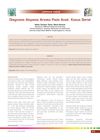13 citations,
January 2017 in “Annals of dermatology/Annals of Dermatology” Simvastatin/ezetimibe may help some patients with severe alopecia areata regrow hair.
9 citations,
January 2013 in “Indian journal of dermatology, venereology, and leprology” Infliximab may cause hair loss in Crohn's disease patients.
 6 citations,
February 2021 in “Advances in Clinical and Experimental Medicine”
6 citations,
February 2021 in “Advances in Clinical and Experimental Medicine” Wharton's jelly-derived stem cells were safely used to treat four alopecia patients, resulting in hair regrowth in all of them.
 4 citations,
October 2022 in “Genes”
4 citations,
October 2022 in “Genes” Our microbiome may affect the development of the hair loss condition Alopecia Areata, but more research is needed to understand this relationship.
3 citations,
January 2018 in “Skin Appendage Disorders” Nail issues are common in alopecia areata patients.
 1 citations,
April 2023 in “Frontiers in Immunology”
1 citations,
April 2023 in “Frontiers in Immunology” New treatments for hair loss from alopecia areata may include targeting immune cells, using stem cells, balancing gut bacteria, applying fatty acids, and using JAK inhibitors.
 1 citations,
March 2023 in “Clinical, Cosmetic and Investigational Dermatology”
1 citations,
March 2023 in “Clinical, Cosmetic and Investigational Dermatology” Current treatments for Alopecia Areata have mixed success, and there's a need for better, more accessible options and support for affected individuals.
 August 2024 in “Frontiers in Public Health”
August 2024 in “Frontiers in Public Health” Alopecia Areata severely impacts mental health, causing anxiety and depression, affecting quality of life.
 March 2024 in “Skin research and technology”
March 2024 in “Skin research and technology” High CRP levels could indicate vitamin D deficiency in people with alopecia areata.
 October 2023 in “Acta dermato-venereologica (Print)”
October 2023 in “Acta dermato-venereologica (Print)” People with severe hair loss have lower zinc levels in their blood.
 June 2023 in “British Journal of Dermatology”
June 2023 in “British Journal of Dermatology” Baricitinib was effective and safe for severe hair loss treatment over 6 months.
 February 2023 in “Archives of Dermatological Research”
February 2023 in “Archives of Dermatological Research” Laser treatment, especially when combined with other therapies, is effective for hair regrowth in alopecia areata.
 April 2022 in “Cermin Dunia Kedokteran”
April 2022 in “Cermin Dunia Kedokteran” Accurate diagnosis and understanding of alopecia areata in children are crucial for proper treatment.
December 2021 in “IP Indian journal of clinical and experimental dermatology” PRP therapy significantly improved hair growth in a girl with chronic alopecia areata.
53 citations,
July 2018 in “Drug design, development and therapy” Janus kinase inhibitors show promise in treating alopecia areata but need better topical formulations.
22 citations,
September 2020 in “The journal of investigative dermatology/Journal of investigative dermatology” The study's results on the effectiveness of low-dose IL-2 for alopecia areata and its impact on immune cells were not provided.
14 citations,
September 2021 in “Journal of Inflammation Research” Alopecia areata patients, especially women with nail issues or atopic diseases, are at higher risk for other autoimmune diseases.
14 citations,
January 2016 in “Annals of dermatology/Annals of Dermatology” Oral cyclosporine is more effective and safer than betamethasone for treating alopecia areata.
 11 citations,
October 2021 in “Stem Cell Research & Therapy”
11 citations,
October 2021 in “Stem Cell Research & Therapy” Hair follicle stem cells reduced hair loss and inflammation in mice with a condition similar to human alopecia.
9 citations,
January 2015 in “Annals of dermatology/Annals of Dermatology” Alopecia areata in elderly people is usually mild and responds well to treatment.
 7 citations,
February 2022 in “JAAD International”
7 citations,
February 2022 in “JAAD International” COVID-19 may be linked to hair loss or worsening of hair loss in some people.
6 citations,
October 2021 in “Biomedical Research and Therapy” Alopecia areata patients have higher levels of IL-6 and TNF-α.
 5 citations,
April 2015 in “HSOA journal of clinical dermatology & therapy”
5 citations,
April 2015 in “HSOA journal of clinical dermatology & therapy” Triamcinolone acetonide mesotherapy may be effective for treating patchy hair loss in alopecia areata.
 4 citations,
March 2022 in “Dermatology and Therapy”
4 citations,
March 2022 in “Dermatology and Therapy” People with moderate hair loss from Alopecia Areata feel more impacted than those with no or almost complete hair loss, and are more likely to seek treatment.
 3 citations,
July 2022 in “Indian journal of dermatology, venereology, and leprology”
3 citations,
July 2022 in “Indian journal of dermatology, venereology, and leprology” Patients with alopecia areata have higher oxidative stress and lower antioxidant levels.
 3 citations,
June 2020 in “Cureus”
3 citations,
June 2020 in “Cureus” A woman's hair loss led to discovering she had lupus.
2 citations,
August 2022 in “Frontiers in Immunology” Microneedling with betamethasone led to almost complete hair regrowth in severe alopecia areata.
2 citations,
January 2021 in “Indian Journal of Dermatology, Venereology and Leprology” Betamethasone is more effective for hair regrowth than latanoprost but has more side effects.
 2 citations,
January 2020 in “Skin appendage disorders”
2 citations,
January 2020 in “Skin appendage disorders” Early onset, severe types, nail changes, family history, and body hair loss worsen alopecia areata prognosis; sticking to treatment helps.
1 citations,
April 2024 in “Journal of Drug Delivery Science and Technology” Microneedles combined with conventional therapies show promise in treating alopecia areata.
















